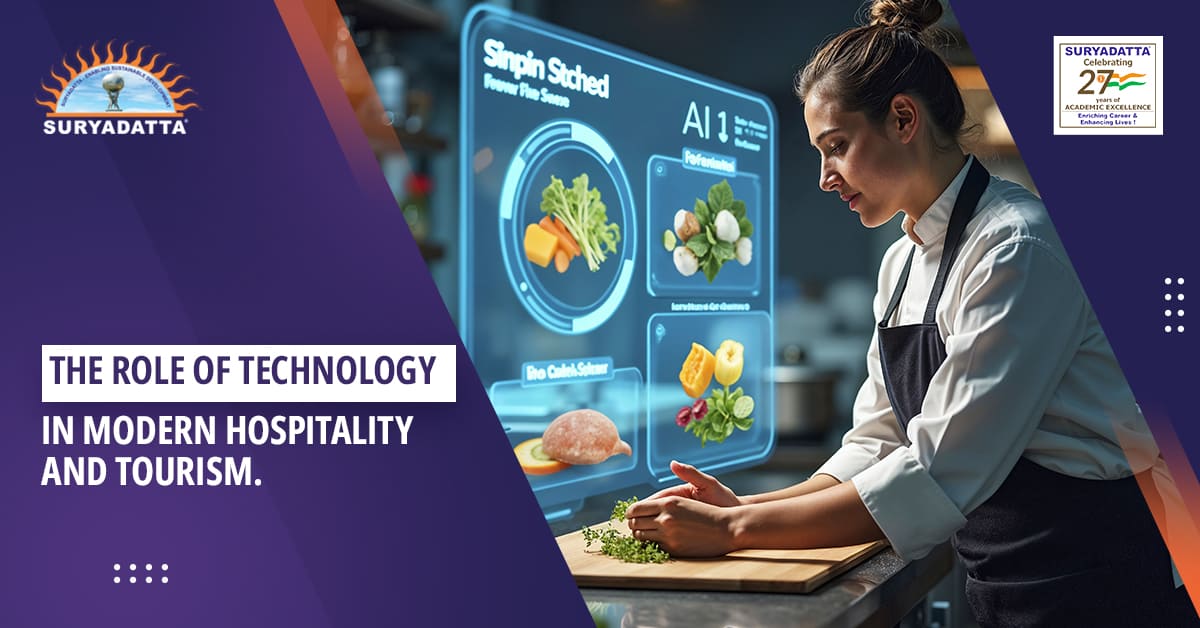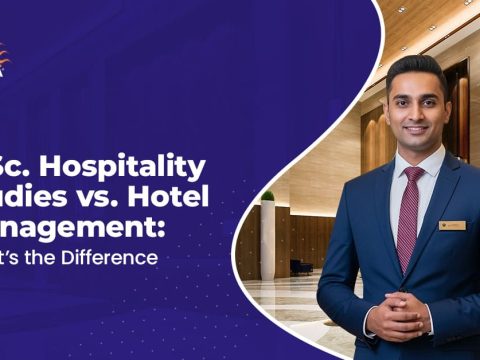As a professor in Hospitality and Tourism Management in Pune, I’ve witnessed firsthand how technology has revolutionized the way we experience travel, lodging, and customer service.
From AI-driven chatbots to smart hotels, the industry is undergoing a seismic shift—and students preparing for careers in this field must understand these changes to thrive.
In this blog, we’ll explore the transformative role of technology in modern hospitality and tourism, backed by authoritative data, and discuss how institutions like SCHMTT are equipping students to lead this digital evolution.
1. Personalization Through Artificial Intelligence (AI)
The demand for personalized experiences is at an all-time high. Hotels and travel agencies now use AI to analyze customer preferences and predict behavior. For instance, platforms like Booking.com and Airbnb leverage machine learning to recommend destinations, accommodations, and even local experiences tailored to individual travelers. According to a 2023 McKinsey report, 76% of consumers expect companies to personalize interactions , and AI is the backbone of meeting this expectation.
In Pune, where tourism is booming—from heritage sites like Shaniwar Wada to modern tech hubs—hotels use AI chatbots to handle bookings, answer FAQs, and even resolve complaints in real-time. This not only enhances guest satisfaction but also streamlines operations.
2. Internet of Things (IoT): The Rise of Smart Hotels
Imagine checking into a hotel where your room adjusts the temperature, lighting, and even the shower pressure based on your preferences. IoT makes this possible. Smart devices like voice-activated assistants (e.g., Alexa), keyless entry systems, and energy-efficient sensors are now standard in luxury hotels. A 2022 Statistacal study revealed that 55% of global hoteliers have adopted IoT solutions to improve guest experiences and reduce operational costs.
Closer home, Pune’s luxury hotels, such as The Westin and JW Marriott, use IoT for predictive maintenance (e.g., detecting HVAC issues before they escalate) and enhancing guest comfort. For students, understanding IoT integration is no longer optional—it’s a career imperative.
3. Mobile-First Travel: Apps and Contactless Services
The pandemic accelerated the shift to contactless technology, and mobile apps are now central to the traveler’s journey. From digital check-ins to mobile payments, apps like OYO and MakeMyTrip have redefined convenience. A Skift report highlights that 68% of travelers prefer hotels with mobile self-service options .
In Pune, where students and professionals frequently travel for education and work, mobile-first solutions are critical. Apps like RedBus and Uber have simplified local transportation, while platforms like Zomato and Swiggy enable seamless dining experiences.
4. Big Data: Powering Smarter Decisions
Data analytics is the unsung hero of modern hospitality. Hotels and tourism boards use big data to forecast demand, optimize pricing, and design targeted marketing campaigns. For example, airlines like IndiGo use dynamic pricing algorithms to adjust fares in real-time based on demand, competition, and even weather patterns.
A 2023 Hospitality Tech Survey found that 89% of hotel managers rely on data analytics for revenue management. In Pune, students at SCHMTT learn to harness tools like Google Analytics and Tableau to decode customer behavior—a skill that sets them apart in job markets.
5. Virtual Reality (VR) and Augmented Reality (AR): Redefining Experiences
VR and AR are transforming how travelers explore destinations. Imagine a student in Pune taking a virtual tour of the Taj Mahal before booking a trip, or a hotel using AR to overlay historical facts on a smartphone screen during a heritage walk. These technologies are not just gimmicks; they drive engagement.
According to PwC, VR in tourism will grow at a CAGR of 25% through 2027 . SCHMTT integrates VR training modules to help students simulate real-world scenarios, from managing hotel crises to designing virtual travel itineraries.
6. Sustainability Tech: The Green Revolution
Sustainability is no longer a buzzword—it’s a business imperative. Hotels are adopting tech-driven solutions like energy management systems, water-saving devices, and AI-powered waste reduction tools. For instance, ITC Hotels’ “Sunrise” initiative uses IoT to reduce energy consumption by 30%.
In Pune, where environmental awareness is rising, students learn to balance profitability with planet-friendly practices. SCHMTT’s curriculum includes modules on sustainable tourism tech, preparing graduates to lead eco-conscious initiatives.
Why Pune Students Should Embrace Tech-Driven Hospitality Education
The hospitality industry’s tech transformation demands professionals who are both digitally savvy and customer centric. At Suryadatta College of Hospitality Management & Travel Tourism (SCHMTT), established in 2004 and affiliated with Savitribai Phule Pune University, we bridge the gap between academia and industry.
Why SCHMTT Stands Out:
- Accredited Programs : Approved by DTE and recognized by the Govt. of Maharashtra, we offer B.Sc. Hospitality Studies, Masters in Tourism, and International Certifications from AHLEI.
- Industry-Aligned Training : Our partnerships with Pune’s top hotels and tech firms provide hands-on exposure to tools like Opera PMS and Revenue Management Systems.
- Focus on Innovation : From IoT labs to VR training, we ensure students master the technologies shaping the future.
Conclusion: Your Future Starts Here
Technology is not just changing hospitality—it’s redefining it. As a student in Pune, you’re at the epicenter of India’s tech and tourism growth. By choosing SCHMTT, you’ll gain the skills to lead this evolution.
Ready to embark on this journey? Explore our programs in Hospitality, Travel, and Tourism at SCHMTT—a recognized Study Center for YCMOU (Under SIVAS – SSIHM). Join a legacy of excellence and transform your passion into a thriving career.
Enroll now at SCHMTT, where tradition meets innovation.




